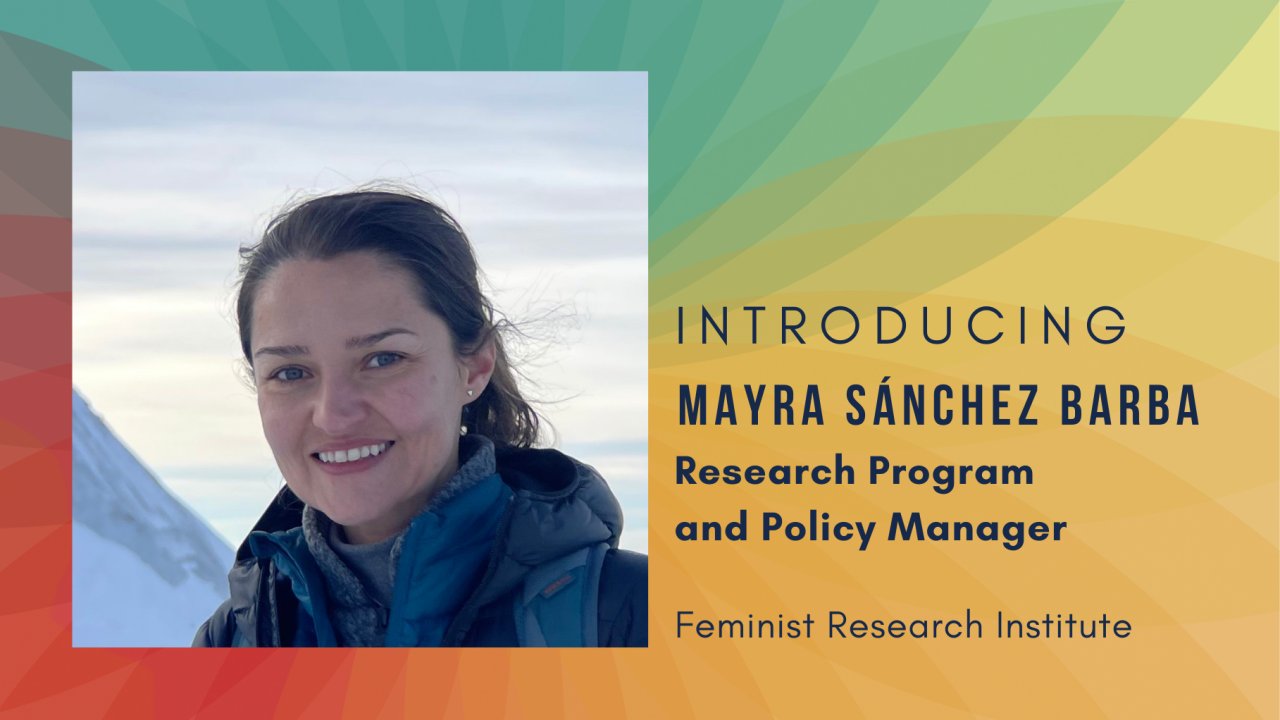
Introducing Mayra Sánchez Barba, FRI Research Program and Policy Manager
Mayra Sánchez Barba is the Research Program and Policy Manager at the Feminist Research Institute. FRI sat down with Mayra to learn more about her and her research.
FRI: Tell us a little bit about yourself.
Mayra Sánchez Barba: I was raised in Mexico and Southern California, in both countries in very large cities. From an early age, I became very aware of the stark contrasts between different parts of the cities and issues such as racial inequities. Education was very important to the story of my family, not only as a way to access opportunities but also to understand and engage with the world and imagine possibilities. I remember very well my father encouraging me to always question, “Who writes history?” This has made me very interested in how certain narratives, ideas, or stories become dominant while others are disregarded or forgotten. In this sense, to trace how power is at play through the stories we tell. And fundamentally, I think that feminist theory offers us sets of critical frameworks and tools to attend to, challenge and transform power by uncovering and retelling other stories of our world. So I try to use this approach in my work, which has been very multidisciplinary.
After I did my Bachelor’s in Mexico, I came to Davis to pursue my graduate studies. I came for my Master’s and I ended up going into a PhD in Geography with a Designated Emphasis in Feminist Theory and Research Methods. Drawing on feminist theory, environmental justice, science and technology studies (STS), and critical race theory, my dissertation focused on how local communities in the Central Coast of California come to understand and care for the impact of chronic and intergenerational exposure to agricultural pesticides.
FRI: How did you become interested in your research? What motivated you to do this kind of work?
MSB: When I moved to Davis, I started learning more about the enormous presence of agriculture in the region. I was curious to see how it shaped everything: the economy, the demographics, migration patterns, class dynamics, labor, the landscape, and so many environmental issues around how the land is owned and managed. Particularly, I was interested in different forms of labor including social reproduction and care work, a topic that intersects with gender, race, and class. Pesticides already interested me due to their troubled history, the politics of their scientific development and regulation, how they are spread globally along with notions of progress and modernization, and of course, their ecological impact in terms of pollution, illness, and extinction. Here in California, pesticides are used at a massive scale, so I think it’s so important to shed light on how we grow our food and people’s lived experiences–particularly those who are the most impacted by these systems. However, the matter of massive use of industrial chemicals is an urgent issue everywhere.
FRI: What are you most excited about doing in your new role as Research Program and Policy Manager at the Feminist Research Institute.
MSB: I am excited to join FRI at this moment and be involved in collectively imagining new possibilities and opportunities to take place in the next few years. I'm very interested in topics that center on our interconnectedness with the environment, with the land we are settled in. I am eager to learn from and build on the work that FRI has done these past couple of years. I would also like to take on this opportunity to engage with students as well as community partners and other college campuses doing similar work.
FRI: Lastly, welcome back to Davis! Just for fun, what are some local places you are excited to revisit now that you're back?
MSB: For food, Sam’s Cuisine and Yuchan Shokudo (formerly Yakitori Yuchan). They both have amazing, delicious food and wonderful service. For the outdoors, I love Putah Creek and would love to visit the Yolo Bypass Wildlife Area.